在线购房解决方案
产品囊括七大核心模块、100多个系统功能
在线营销阵地
楼盘展示、视频展示、vr展示、购房咨询、分销拓客、报备管理、客户分析。全天候营销不掉线。
在线看房
支持图片看房、视频看房、vr看房,全方位展示项目信息,足不出户获取全面信息。
置业顾问
关联上级置业顾问,轻松锁客。一键拨打,不错失每一位客户!
客户拓展
内置全民经纪营销模块,支持二级分佣,客户裂变源源不断。
客户跟踪
可在小程序上看到每一位访客的行为路径,智能分析访客意向,轻松跟进。
在线订房
在线选房、订房、签合同,全程无纸化,一部手机就搞定。
线上展厅
足不出户在线看房
图文、视频、vr等多种呈现方式全面直观的展示房源信息,打造24小时在线楼盘。
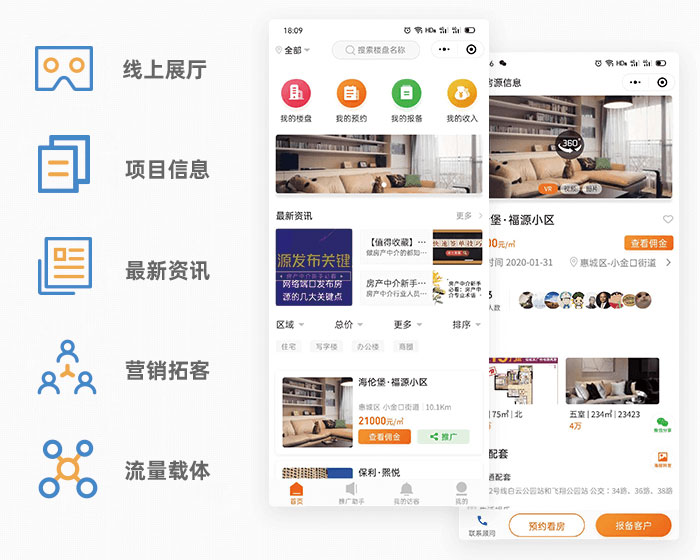
在线顾问
自动关联置业顾问,随时提供专业服务

客户雷达
跟踪客户浏览轨迹,建立客户画像和意向分析,跟进精准
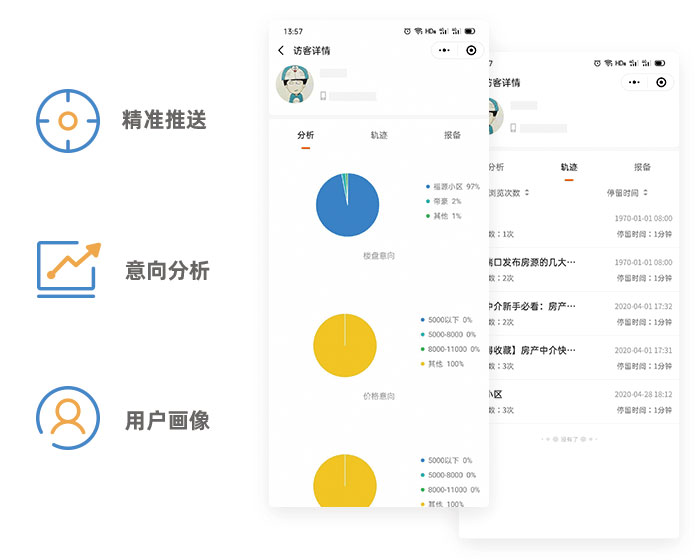
拓客辅助
统一提供推广物料、素材;以及搭建拓客教程。帮助顾问更好获客。
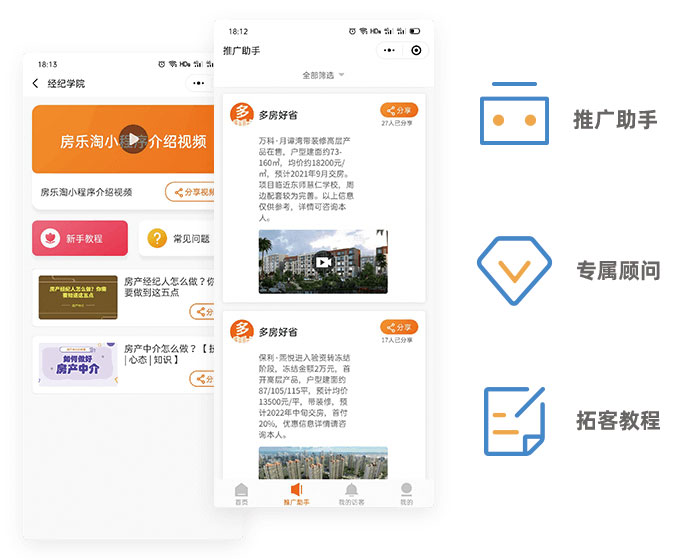
全民分销
打通微信社交裂变,让客户推客户,获取更多潜在客户。

销售关联
置业顾问数字化移动管理,提高管理效率
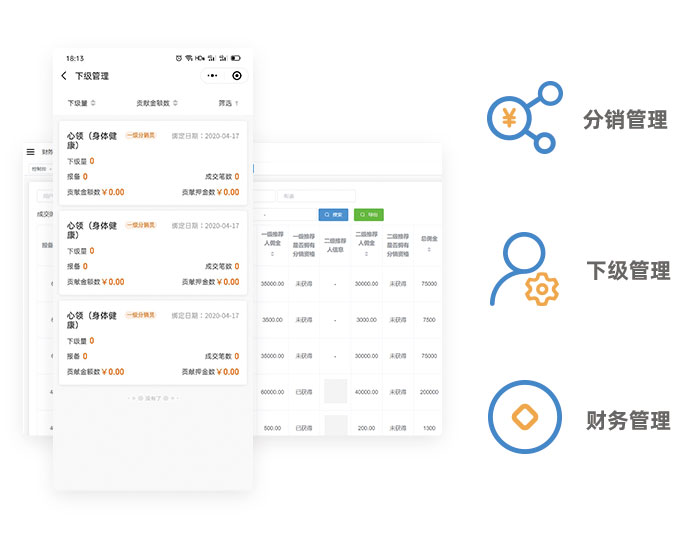
数据查看
+实现营销运营数据可视化,拓客业绩,佣金数据一目了然
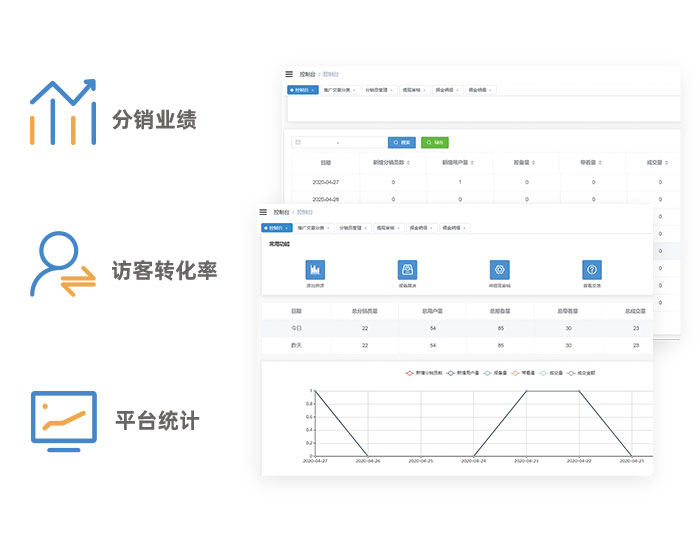
房产项目管理系统哪家好(房产项目管理方案)
Choosing the Best Real Estate Project Management System
Abstract:
Selecting the right real estate project management system is crucial for effective project oversight and success. This article explores various aspects of leading project management solutions in the real estate industry. From features to customization, integration, scalability, support, and cost-effectiveness, each aspect is dissected to help stakeholders make informed decisions.
---
Features and Functionality
In the realm of real estate project management systems, the features and functionalities offered by different platforms play a pivotal role in decision-making. A robust system should encompass a wide array of tools, including task management, document sharing, budget tracking, scheduling, and reporting capabilities.
Comprehensive Task Management: A superior project management system should offer a comprehensive task management interface. It should allow users to create, assign, and track tasks effortlessly. Moreover, features like task dependencies and subtasks enhance project organization and efficiency.
Effective Document Sharing: Effective collaboration relies heavily on seamless document sharing. The ideal system should provide secure cloud storage for documents, ensuring easy access for all project stakeholders. Version control and document tracking features further streamline collaboration efforts.
Budget Tracking and Financial Management: Real estate projects involve intricate budgeting and financial management processes. The chosen management system must offer robust tools for budget tracking, expense management, and financial reporting. Integration with accounting software can also be beneficial for seamless financial operations.
Advanced Scheduling Capabilities: Efficient scheduling is vital for meeting project deadlines and milestones. A top-tier project management system should offer advanced scheduling capabilities, including Gantt charts, resource allocation, and milestone tracking. This enables project managers to effectively plan and monitor project progress.
Comprehensive Reporting Features: Real-time reporting is essential for project stakeholders to stay informed about project performance. The selected system should provide customizable reporting features, allowing users to generate insightful reports on various aspects of the project, such as progress, budget utilization, and resource allocation.
Integration with Third-Party Tools: Seamless integration with third-party tools enhances the functionality and versatility of a project management system. Compatibility with popular tools like CRM software, accounting software, and communication platforms ensures smooth data flow and collaboration across different aspects of the project.
---
Customization and Flexibility
Customization and flexibility are paramount when choosing a real estate project management system. Every project is unique, with its own set of requirements and workflows. A customizable system allows stakeholders to tailor the platform according to their specific needs, fostering efficiency and productivity.
Flexible Workflow Configuration: A leading project management system should offer flexible workflow configuration options. Users should be able to customize workflows, task templates, and approval processes to align with the project's unique requirements. This flexibility ensures that the system adapts to the project's evolving needs.
Customizable Dashboards and Views: Personalized dashboards and views enhance user experience and productivity. The chosen system should allow users to customize their dashboards according to their preferences, displaying relevant project metrics, task lists, and notifications. This customization empowers users to focus on what matters most to them.
Adaptable Reporting Templates: In addition to customizable reports, the system should offer adaptable reporting templates. Users should have the flexibility to create and save custom report templates based on their reporting needs. This feature streamlines the reporting process and ensures that stakeholders receive timely and relevant information.
Scalability and Growth Potential: As projects evolve and expand, scalability becomes a critical factor. The selected project management system should be scalable to accommodate growing project demands and team sizes. Scalability ensures that the system remains effective and efficient, even as project scope increases over time.
API and Integration Flexibility: An open API architecture facilitates seamless integration with other software systems and tools. The chosen system should offer robust API capabilities, allowing for easy integration with existing software infrastructure. This integration flexibility enables stakeholders to leverage the full potential of their technology stack.
Support for Agile Methodologies: Agile project management methodologies are increasingly popular in the real estate industry due to their flexibility and adaptability. The chosen system should support agile practices, such as iterative development, continuous feedback, and adaptive planning. This ensures that project teams can respond quickly to changing requirements and market conditions.
---
Scalability and Integration
Scalability and integration are crucial aspects to consider when evaluating real estate project management systems. A scalable system can accommodate growth and evolving project needs, while seamless integration with other tools enhances efficiency and collaboration.
Scalability for Project Growth: Real estate projects vary in size and complexity, and the chosen management system should be able to scale accordingly. Scalability ensures that the system can handle increasing project demands, such as additional users, tasks, and data volume, without compromising performance or functionality.
Integration with Existing Systems: Seamless integration with existing software systems is essential for maximizing efficiency and collaboration. The selected project management system should offer robust integration capabilities, allowing for seamless data exchange and workflow automation. Integration with CRM systems, accounting software, and communication platforms streamlines project operations and enhances productivity.
Compatibility with Mobile Devices: In today's fast-paced business environment, mobile accessibility is paramount. The chosen project management system should be compatible with mobile devices, allowing users to access project information and collaborate on the go. A mobile-responsive interface ensures that stakeholders can stay connected and productive, whether they're in the office or in the field.
Cloud-Based Architecture: Cloud-based project management solutions offer numerous benefits, including flexibility, scalability, and accessibility. The selected system should be built on a cloud-based architecture, enabling users to access project data and tools from anywhere with an internet connection. Cloud hosting also ensures data security, reliability, and scalability, making it an ideal choice for modern real estate projects.
Scalable Pricing Models: Pricing is a crucial consideration when selecting a project management system. The chosen system should offer scalable pricing models that align with the project's budget and requirements. Flexible pricing plans, such as tiered subscriptions or pay-as-you-go models, allow stakeholders to scale their usage and costs according to their needs.
Support and Training Resources: Effective support and training resources are essential for maximizing the value of a project management system. The chosen provider should offer comprehensive support services, including technical assistance, training programs, and user documentation. Access to a knowledgeable support team ensures that stakeholders can resolve issues quickly and make the most of the system's capabilities.
---
Support and Training
Support and training are integral components of a successful real estate project management system implementation. Comprehensive support services and training resources empower users to utilize the system effectively, driving project success and stakeholder satisfaction.
Dedicated Customer Support: A reliable project management system should offer dedicated customer support to assist users with technical issues and inquiries. The support team should be responsive, knowledgeable, and accessible via multiple channels, such as phone, email, and live chat. Timely resolution of issues minimizes downtime and ensures uninterrupted project operations.
Onboarding and Training Programs: Effective onboarding and training programs are essential for user adoption and proficiency. The chosen provider should offer comprehensive onboarding sessions and training resources to familiarize users with the system's features and functionalities. Hands-on training sessions, video tutorials, and user guides empower stakeholders to leverage the full potential of the system.
Ongoing Technical Assistance: Beyond initial onboarding, ongoing technical assistance is crucial for addressing evolving user needs and challenges. The chosen provider should offer continuous technical support and updates to address software bugs, performance issues, and security vulnerabilities. Regular system updates ensure that stakeholders benefit from the latest features and enhancements.
User Community

